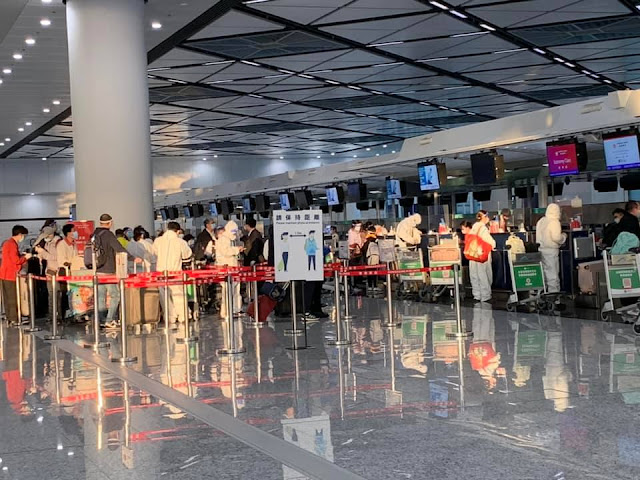By The SUN
 |
| Scene at the airport today: More people are leaving due to Covid spread and strict quarantine rules |
Chief Executive Carrie Lam has ruled out cutting the 14-day
quarantine for travelers arriving from abroad, despite a new discharge criteria
put in place by the Centre for Health Protection that allows locally infected patients
who have had at least two doses of the vaccine to leave their isolation after
testing negative on days six and seven.
“I do appreciate the sort of frustrations of some of the
arrivals from overseas that while we are adjusting our own quarantine and
isolation policies…we are still adhering to the same quarantine arrangement for
inbound travelers,” Mrs Lam said at the press briefing she held Friday.
“This is because of the risk that we must ensure that we will
not impose further on the hospitals. As I said, I can understand their
frustrations, but at this moment, Hong Kong is facing an unprecedented
epidemic. At this point in time my first priority is to ensure that we could
protect people in Hong Kong and also protect the public hospital system. To
make any relaxation for arrivals which will run any risk in those respects is
not something the Chief Executive would like to see.”
 |
| PINDUTIN PARA SA DETALYE |
However, she said that after the fifth wave of the epidemic
has subsided, she will take another look at border control, particularly for
Hong Kong residents who have been unable to come back because of flight bans
imposed on nine countries. She said the government will look at mapping out a
pathway for their return home.
At the same time, she said the government has no plans of
relaxing the most stringent social gathering rules imposed as the surge in
Covid cases intensified towards the end of last month.
Mrs Lam said the measures remain a key part of the
anti-pandemic fight. Despite recent figures indicating the fifth wave has
peaked after topping more than 50,000 daily infections she said it was too early
to predict a downward trend.
 |
| PINDUTIN PARA SA DETALYE |
But she said the government will keep an eye on the situation
and revise policies as it sees fit.
The strict measures which remain in place until Apr 20,
includes suspension of face-to-face classes, allowing no more than two persons
to gather in public, and the closing of most venues where people tend to gather
like bars, karaokes, cinemas and amusement parks.
Asked about a report that said a study by the University of
Hong Kong had challenged the effectiveness of the policy banning dine-ins at
restaurants after 6pm, the CE said she was surprised to hear about it.
 |
But she said HKU’s dean of medicine Prof Gabriel Leung had
told someone in her staff that his statement was taken out of context, and that
he could be quoted on this.
The CE added that “Actually, if you thought through it, it's
not quite logical. If we don't allow people to come in a restaurant, that must
have a better effect than allowing people to come in, take off their masks and
then have their meals together.”
Mrs Lam was joined at the daily briefing by the Secretary for
the Civil Service Patrick Nip and the Secretary for Labour and Welfare Law
Chi-kwong.
 |
| Pindutin para sa detalye |
Nip, who oversees Hong Kong’s vaccination program, said the government
is aiming to vaccinate all elderly residents in care homes by Mar 18. The move
is prompted by the high infection rate and mortality among residents in such
facilities.
He said around 89 percent of people aged 60 to 69 have
received at least one dose of a vaccine, but the rate dipped to only 79% among
those between the ages of 70 to 79.
Of those aged 80 and above who are at most risk, only 54%
have had at least one jab.
 |
| Press for details |
He said about 40,000 residents in 970 care homes have already
been inoculated, and outreach teams will go to the remaining 130 homes to
ensure those who are medically fit to receive the vaccine are also jabbed.
Elderly people who live alone will also be visited at a later
time so they could also be vaccinated at home.
Law said the reason many elderly residents in the care homes
were not vaccinated was because of the resistance from relatives. About 10
percent of family members are said to oppose the vaccination of their elderly
relative.
 |
| BASAHIN ANG DETALYE! |
In fact, allowing the elderly to get vaccinated is not just a
way of protecting them but other members of the family too, said Law.
 |
| PADALA NA! |
 |
| CALL US! |












